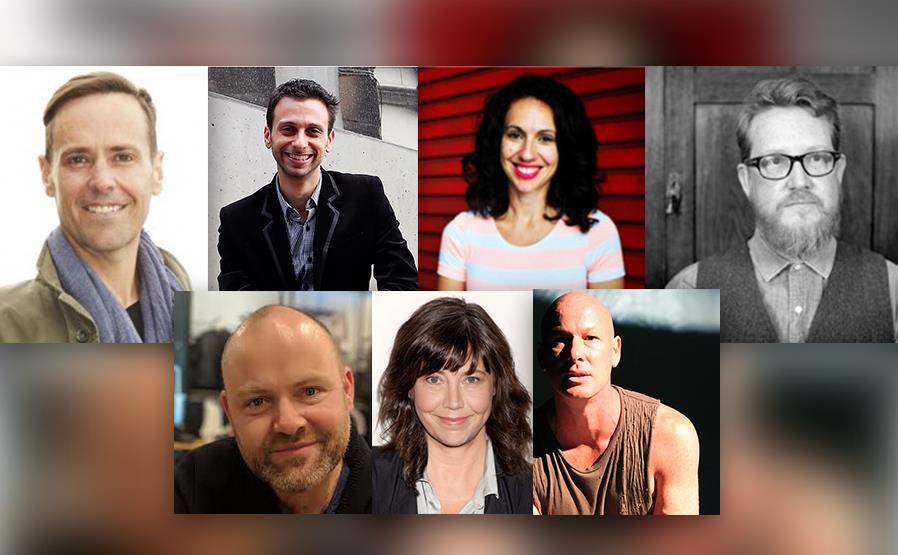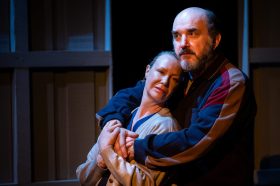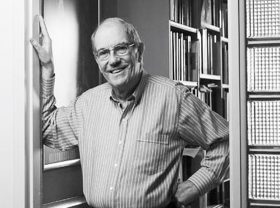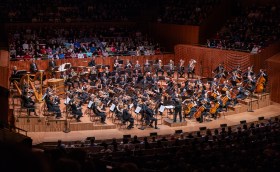21 Reasons I Know the Australian Arts Industry Will Bounce Back Better than Ever:
Yes, these are dark times my friends, you don’t need me to tell you that. My job currently is trying to work out how to save an organisation that relies on Box Office and Venue Hire for more than 80% of its revenue (and we’re the lucky ones!). Saving jobs, survival, is my total focus for now. But my mind’s started to turn to reasons why our industry might not just survive, but one day roar back to life better than ever. All of the reasons I could think of were people…
It started as a mental health project, really. I was feeling so despondent, and hopeless, and truly searching for reasons to believe everything was going to be ok. Now that I’ve finished all 21, I realise that it’s given me so much hope, focussing on other people’s strengths and capacities, not contemplating my own sadness.
Here – in the last of three parts – are the final seven of those 21 entries. Consider them love letters to our theatre industry.
Read: 21 reasons our arts industry will bounce back better than ever (Part One)
Reason 15: Kevin Du Preez
Leadership’s never been more important in our industry, and is only going to become more crucial as we work to rebuild the arts in Australia. There’s one person who’s been thinking deeply about arts leadership for most of the last ten years, and working to develop and nurture leaders for our industry. Kevin Du Preez has worked at the Australia Council since 2010, and is currently the Director of Capacity Building. I’m not sure I know exactly what his job title means, or the whole scope of his role, but I will say one thing – Kevin is amazing. He’s built the Australia Council’s leadership programs into a crucial part of how we develop people as an industry. For anyone who’s lucky enough to have participated in one of his programs (I’m a proud alumni!) one thing starts to dawn on you after a couple of days. As well as spending time with an amazing group of people, sharing experiences and ideas, discussing how to be better leaders, you begin to realise that you’re also having leadership modelled for you by the person who manages the program (often quietly, behind the scenes). If true leadership is serving others, and I believe it is, then Kevin Du Preez is an extraordinary leader. For each cohort of the leadership program, he calls us up to become better leaders by treating us like leaders. His gentle but passionate, intelligent but never overbearing way of working sets a great example for all who come in contact with him. There’s not much about leadership he hasn’t considered, studied and tried (pretty successfully) to practice. I don’t know what the future of the Australia Council will be in the post-crisis world – what it will focus on, what compromises and choices it may have to make, but I hope for all of our industry that Kevin and his programs are given the prominence that both deserve.
Reason 16: Simon Abrahams
The Australian arts industry post-COVID19 is going to need a whole lot of re-imagining, so it makes sense that we’ll be looking to those with a track record of thinking outside the normal industry models – people who are innate agents of change. In the last few years, the Melbourne Fringe has rethought the ‘fringe’ label to reinvent itself as so much more than a festival, becoming a major commissioner and developer of new works, running a venue year-round, and building new models for the democratising of the performing arts that make space for new, diverse, artistic voices. Leading this transformation is Melbourne Fringe Creative Director and CEO, Simon Abrahams, building on his years of work in programming, producing, and leadership roles at some of Victoria’s most important cultural organisations, and as a founder of Theatre Network Australia, an organisation he’s been instrumental in turning into the crucial sector support organisation it now is. Simon’s passion for artists and their empowerment is evident in everything he does. He’s energetic, infectiously positive, and brilliantly persuasive. Not surprisingly his immediate response to the COVID-19 crisis was to think of what artists needed, and to create more funded opportunities for artists with Melbourne Fringe. I’m reliably informed he’s now planned how to deliver Melbourne Fringe this year in at least three different versions – all online in lockdown mode; live in venues, but with distancing in place; and finally how it normally is delivered – in all its glory, just in case restrictions are totally gone by then. Being able to imagine all those different options is an indication of Simon’s superpower – his imagination. If there’s 21 people in a room with a whiteboard trying to work out how we as an industry get out of this shit show, I know for sure I want Simon Abrahams at the table.
Reason 17: Louise Bezzina
Of all our arts organisations, it’s perhaps the major festivals who will most need to examine their fundamental business model post COVID-19. To one degree or another, they’ve all relied on cherry-picking the best of international work to create exciting programs. Overnight, the unsustainability of that strategy has been made apparent. A radical rethink of the role of festivals, their place in the interconnected ecology of the arts, and their meaning and importance to the communities in which they take place, is now required. Of all the festival directors, one seems uniquely placed to face this major shift. The Artistic Director of Brisbane Festival, Louise Bezzina, is dynamic, passionate, and committed to the development of artists and communities. Well-advanced in programming her first festival for September 2020, putting that aside and doing a total rethink is a massive task in her first year in the role. But honestly, I can’t think of anyone better-equipped for the challenge. Unlike many major festival directors, Louise’s journey to that world hasn’t been through leading a major producing company, state theatre company or the like. Instead it comes after nine years founding and developing the Gold Coast’s signature arts event – Bleach Festival. Without the established funding or audiences of a cushy capital city arts gig, Louise built Bleach from the ground up – convincing artists, audiences, business and government that it was crucial for the city’s cultural development. As a result, Bleach has become perhaps the most locally loved arts festival of its scale in Australia. Now festivals need to become more local, turn to community, properly address artist development, and examine their relevance in a world turned upside down, Louise’s moment has come. She’s ideally placed to show us what a major festival could really mean to an Australian city. My bet is, what she does now has a major impact on the future role of festivals in Australia. And if the state borders open by September, I‘m going to make sure I’m there to witness it!
Reason 18: Andy Packer
Rebuilding audiences is going to be a major task post COVID-19, and with resources scarce, we’re going to have to think carefully about the audiences we most need to nourish. It’s become a cliché to say that there is no more important audience than young people, but of course a cliché is just a much repeated truth! Of all the people in Australia who make magical theatre for young audiences (and let’s face it we kind of lead the world in this field) I can’t think of a more inspiring practitioner than Andy Packer, the founder and Artistic Director of Adelaide-based Slingsby. To say Andy makes theatre for young audiences isn’t strictly true, he makes great theatre, full stop, but it happens that his theatre invites and engages with young people just as much as it does adults. Incredible works like The Tragical Life of Cheeseboy, The Young King and Emil and the Detectives have taken Andy and Slingsby around the world, bringing international acclaim and more and more international touring. So an immediate stop to international travel in March hit Slingsby hard. But when it comes to evolving and adapting, Andy is a seasoned veteran. A few years ago, when Slingsby lost its annual funding from the Australia Council (something, shockingly, several more young people’s theatre companies have recently experienced), Andy didn’t pack up and walk away, as many would have. He first appealed to his audience, who brilliantly rallied to save the company financially, and then he went back to work, making a series of undeniably remarkable shows, building a sustainable base for the company touring non-stop, nationally and internationally. Andy is passionate, committed, imaginative, and more than a little determined. Now that so many of us are facing having to evolve and adapt, or be swept away by this crisis, Andy is someone whose experience and qualities can provide a guiding light we’d be wise to follow.
Reason 19: Daniel Clarke
Programming can be difficult at the best of times – navigating the minefield of dates, dollars, venue and artist availability, audience tastes, and so on. Now the job’s got even more difficult, as we face the unknown of when venues will reopen, if audiences will be restricted, travel restrictions for artists and companies, and the uncertainty of whether audiences will return in their usual numbers. Unpicking the lock to create a successful program in the age of COVID-19 will require the very best programming talent we have. There are few programmers I admire more than Daniel Clarke. When he says ‘check this show out’, I’m pretty sure it’s going to be something very special. Calling Dan a programmer is a little misleading – he’s also a talented director and a highly experienced producer, a background that’s given him an incredible feel for working with artists. Having spent time working in the UK as a director, he changed the face of theatre in Melbourne, putting St Kilda’s Theatre Works well and truly on the national theatre map, before moving on to help shape the programs of both Arts Centre Melbourne and QPAC. He’s got impeccable artistic judgment, real passion, and a skill in championing artists to other programmers, and well… just generally making shit happen! But what really sets Dan apart from many programmers in Australia is his ability to imagine how an audience will connect with an artist or a work – it makes him a leader, not a follower, a programmer who is unafraid to take risks, and confident that what he sees in an artist, others will too. He’s introduced Australian audiences to extraordinary international artists like The Wau Wau Sisters and Nilaja Sun, as well as been an instrumental advocate for incredible Australian artists like Stephanie Lake and Bryony Kimmings. It’s obviously going to be a mammoth task to try and put together a program when venues can finally open, and I for one will be looking to Dan’s lead.
Reason 20: Marion Potts
A crisis like the one we’re in has a tendency to focus the mind on the short term – how do I keep my job? Save others’ jobs? How do I put food on the table? It’s an understandable, necessary, evolutionarily developed response. But our industry desperately needs sharp minds focussed on what comes next, and to be thinking long-term – people who know how to build things, not just prop them up. Marion Potts is one of the sharpest minds we have. She’s a builder, a nurturer of artists, a strategic thinker, and deeply compassionate in the way she works. A Helpmann Award-winning theatre director and an artistic director, her move into the Australia Council (where she excelled as Director of Theatre) perhaps proved a little far from the artistic action for someone so passionate about the creative process. But that experience has given her the broad-ranging, deep understanding of our industry that’s allowed her as Executive Producer of Performing Lines to build that organisation into one of the most effective and important sector influencers. Marion develops and nurtures artists, making incredible work and connecting it to presenters, festivals and companies all over the world. But it is the less visible work of bringing together and cleverly connecting diverse elements of our industry to work strategically towards outcomes that are good for artists and audiences where she has the most impact. Her well-chosen, nationally spread team at Performing Lines, coupled with her ability to speak a diversity of sector languages – artist, producer, presenter, funder – puts Marion in a unique position to help us rebuild our sector for a stronger, more sustainable and effective future. I’ll be cheering her on.
Reason 21: Jacob Boehme
There are times when being a leader means being ahead of the pack, making a stand or taking an action that places you beyond the current accepted thinking in your field, challenging the dreaded ‘status quo’. That can be a lonely place at times, waiting for the world to catch up. Jacob Boehme is one such leader in our industry – unafraid to speak truth to power, challenging us to do better, to be better. A dancer, director and choreographer, Jacob’s works have challenged, entertained and provoked. As an artistic director his credits include being the founding Creative Director of the Yirramboi Festival, where his inaugural program was a stunning example of contemporary curatorial practice, in which each event was connected and had a coherent place in the whole – rare indeed in any arts festival. Jacob’s a leading voice in the movement for our First Nations’ artists to take their rightful place in the sector – with the opportunities, platform, and positions of power that should be theirs. In this he has been, quite rightly, uncompromising. He has provoked and challenged so many of us to make change. His unforgettable speech at the opening of APAM 2018 is so often referred to and quoted that he should be collecting royalties! But while Jacob is never afraid to stand ahead of the pack, he’s also always prepared to stand with us, as a generous guide to those who are prepared to actually do the work. Clearly us whitefellas are painfully slow to learn; centuries of privilege and power can certainly dull your ability to adapt and to see the world as it truly is. As our sector comes out of this crisis, nothing could be more important than to listen to our First Nations leaders, to really listen, and then to take action. Jacob Boehme is one voice we need to listen to more.
Read: 21 reasons our arts industry will bounce back better than ever (Part Two)





